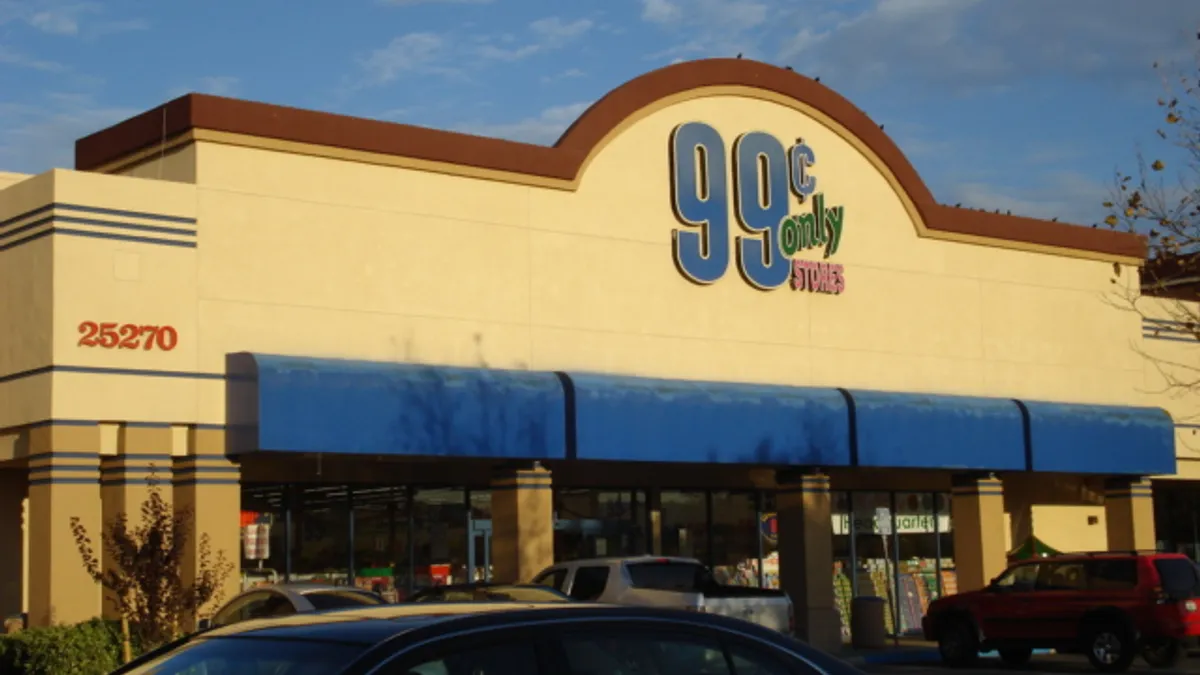Dive Brief:
- Dollar store retailer 99 Cents Only named Jack Sinclair, the company’s chief merchandising and marketing officer, as its new CEO, according to a Friday press release from the company. Sinclair joined 99 Cents Only in 2015 and once headed Walmart’s U.S. grocery business.
- Sinclair will take over the CEO spot from Geoffrey Covert, who is retiring. As part of the executive shuffle, Jason Kidd, senior vice president of store operations, has been appointed as chief operating officer.
- 99 Cents Only also announced that it expected revenue for the previous fiscal year to be as much as $2.27 billion — a potential rise of 12% from $2.02 billion in the previous year — and that same-store sales rose by as much as 8.5%. The retailer expects fourth quarter same-store sales to be up 6% to 7%, making for eight consecutive quarters of positive same-store sales, 99 Cents Only said.
Dive Insight:
The deep discounter’s shift in chief executive comes as 99 Cents Only tries to keep its balance sheet under control.
99 Cents Only Stores operate in a low-margin space that's only gotten more competitive as Dollar General, Dollar Tree, Walmart and others battle for market share. According to CreditRiskMonitor, which tracks the financial risks associated with companies with publicly traded stock or bonds, 99 Cents Only’s risk of filing for bankruptcy is as high as 50%. (In determining risk, the service looks at stock volatility, credit agency ratings, key financial metrics and predictive data gathered from the use of its own platform.)
The 35-year-old chain is yet another struggling retailer owned by private equity. (Ares Management, the Canadian Pension Plan Investment Board and the Gold-Schiffer family bought the chain out in January 2012.)
Despite the discount retailer's high leverage and debt rates, it has seen some success in improving performance. In June, the company reported a net sales increase of 6.7% and same-store sales increase of 6.9%, which Covert attributed to improvements in merchandising and stocking as well as improved logistics execution and reduced shrink. Moody's analysts also point out that 99 Cents Only has installed a perpetual inventory system and has seen positive same-store sales growth for several quarters in a row.
Yet, the company is still losing money. For the first half of the previous year, the company narrowed its loss by nearly $20 million compared to last year, to $42.4 million. Its sales increased during that time as well by about $8 million, to $1.1 billion.
In November, 99 Cents Only said it had amended a term loan facility by three years, from 2019 to 2022. As part of the arrangement, $130 million of the existing first lien term loans held by the the company’s equity sponsors were converted to a new second lien term loan facility. In December S&P, which had downgraded the company in the fall, upgraded the retailer’s debt, saying 99 Cents Only had better liquidity as a result of the amendment. But S&P also issued a negative outlook at the time over analysts' view that "leverage remains very high, and we still view the company's capital structure as unsustainable."
In one effort to boost sales, the company unveiled a new website this year, meant to improve the user experience and create a "treasure hunt experience" through a feed of social content generated by customers.
















